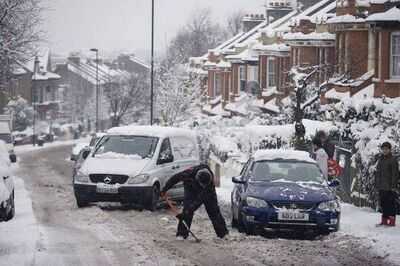As squirrels scurry and spiders take over our homes, nature could be warning us of a winter unlike any we've experienced in recent years. According to age-old myths, Brits could be bracing for a long, cold winter with ominous signs appearing across the UK's wildlife.
Many believe that certain animal behaviours can provide reliable indicators of an upcoming season's severity, with the woolly bear caterpillar being one such creature. The wider the brown middle band on its back, the milder the coming winter is rumoured to be.
However, experts dispute the reliability of a caterpillar as a weather forecaster. Similarly, squirrels are sometimes used to predict whether we'll need to bundle up more than usual in the coming winter months.
- UK snow: Weather map shows where snow will fall this week - check your area
- Lidl rolls out change for all customers at tills in 980 UK stores
If you've noticed squirrels carrying extra weight at this time of year, it could be a sign they're expecting temperatures to drop more than usual. This is also said when there's a pattern of these bushy-tailed creatures hoarding large quantities of nuts to last them until spring.

Meanwhile, spiders spinning larger webs than usual has long been linked to colder temperatures, but these are simply the products of larger, mature spiders, reports the Express.
Spiders flooding into homes en masse during autumn and winter is also frequently attributed to numerous spider species reaching maturity in the autumn, prompting males to venture out seeking females, making them more noticeable indoors.
Other signs of a harsh season include birds, with folklore suggesting migration patterns provide hints about forthcoming weather cycles, which birds supposedly understand instinctively.
Whilst it's accurate that birds can detect approaching storms by sensing shifts in atmospheric pressure, temperature, and humidity, plus hearing infrasound, early southward migration isn't nature's method of warning us about incoming cold weather.
Astronomical winter in the UK is due to commence on December 21, lasting until late March, the Met Office states, though meteorologically speaking, winter's first day is always December 1, finishing on February 28 or 29 during leap years.
The national weather service has characterised the UK as experiencing a "remarkably sunny" year so far, but acknowledged recent temperature drops and dreary periods nationwide.
There's a 55 per cent likelihood of "near average" temperatures and a 30 per cent probability of "mild" conditions, the Met Office's three-month forecast suggests, with just a 15 per cent possibility of a cold season.
These forecasts are based on historical weather patterns and shouldn't be regarded as definitive predictions, rather as guidance.
You may also like

Horror as girl found dead at home in quiet UK village as police investigate 'murder'

Liverpool players hold emergency meeting as Reds seek to avoid 72-year low

Every word Mikel Arteta said on Atletico Madrid, Gyokeres, Lewis-Skelly and ultimate goal

Trump oddly dubs White House official 'Darth Vader' in front of GOP Senators

Lokpal floats tender for Rs 5 crore BMW fleet for 7 members, draws flak







